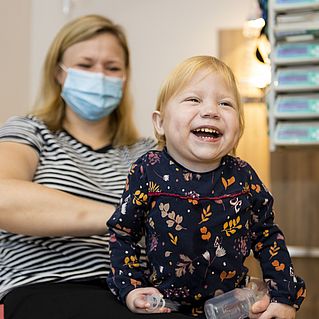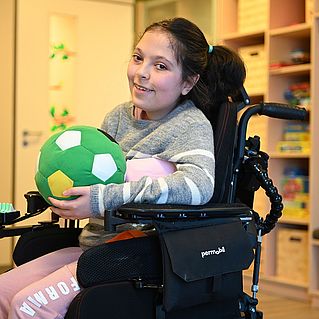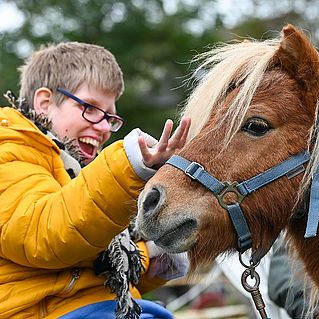
Close to people | Stories from Bethel
Torsten Seligmann is becoming increasingly independent
He has already done the shopping and Torsten Seligmann is about to take care of the laundry. Not just his own, but also that of his flatmate. The man, who has a mental illness, lives with him in the new flat block at the Hoffnungstaler Stiftung Lobetal foundation in Königs Wusterhausen, Brandenburg. There, the 41-year-old has developed a level of independence that would not have been possible in his previous environment.
Until a year ago, Torsten Seligmann lived in a social psychiatric rehabilitation home run by the Asklepios clinics in Teupitz, around 25 kilometres from Königs Wusterhausen. At the facility, he was well provided with food and drink and had a short walk to the day-centre activities on offer. But these advantages had a problematic downside: apart from the monthly visits to his parents, Torsten Seligmann hardly came into contact with the world outside the clinic. Independence? Not a chance!

"I feel at home here."
Things are different now. Torsten Seligmann travels to Lübben in the Spreewald every working day by public transport, where he works in the basket weaving workshop at the "Zum Schober" day care centre. He lives in the centre of town instead of on a hospital site. And he no longer lives in a hospital room, but is now a tenant in a flat with a kitchen and bathroom. "I feel at home here," says Torsten Seligmann and talks happily about living with his flatmate: "We do the shopping, share the groceries and help each other. He does the washing up, I do the drying." Independence? By now they are!

Torsten Seligmann is one of 31 people with mental disabilities who live in 23 single and 4 double flats in the barrier-free house. They also have access to a kitchen and an equally spacious roof terrace. The ground floor is home to the 42-strong multi-professional team, who provide assistance if required.
"Living like you and me, but with support services - that's the concept," explains Stefan Stenzel, psychologist and therapeutic director of the residential centre. Yvonne Hain, Network Manager South-East of the Hoffnungstaler Stiftung Lobetal and therefore also responsible for the home in Königs Wusterhausen, speaks of a "protected reality" for the people living there: "They have the opportunity to go out and come into contact with people and issues. This gives them a different view of things and helps them develop perspectives for themselves."
The washing machine is now running in Torsten Seligmann's flat. He has an appointment with occupational therapist Nina Finke in a few minutes to discuss the shopping and meal preparation for the coming days. He still needs help with this. Overall, however, Torsten Seligmann is making good progress on his path to greater independence. So well, in fact, that he would like to stand as a candidate for the building's tenants' council in the next election.
Text: Philipp Kreutzer | Photos: Frederic Schweizer
This story simply told
Torsten Seligmann used to live in a hospital home. He moved a year ago. He now lives in the town of Königs Wusterhausen near Berlin in a new Bethel home. People with mental disabilities live there. He has a flatmate. He feels much more comfortable in his new home than in his previous one.
Would you like to find out more?
Contact
Hoffnungtaler Stiftung Lobetal
Königs Wusterhausen - Lobetal Wohnen
Fontaneplatz 12a
15711 Königs Wusterhausen
Offers & services
The König Wusterhausen site offers a special form of accommodation for people with mental disabilities. The offer includes comprehensive psychosocial, social space-orientated services as part of participation in areas such as mobility, communication, self-care and home life.









